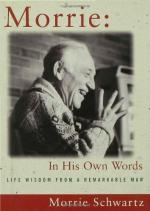
|
| Name: _________________________ | Period: ___________________ |
This test consists of 15 multiple choice questions and 5 short answer questions.
Multiple Choice Questions
1. Eventually, what faith does Schwartz embrace?
(a) Agnostic.
(b) Monotheist.
(c) Atheist.
(d) Polytheist.
2. Schwartz tells those in declining health that they should take on what characteristics?
(a) Hopefulness and happiness.
(b) Jealously and honesty.
(c) Sadness and anger.
(d) Kindness and generostiy.
3. Schwartz must learn to become more _____ as the disease worsens.
(a) Dependent.
(b) Reliable.
(c) Attentive.
(d) Studious.
4. Whom does Schwartz meet who influences him to get into meditation?
(a) A Catholic Priest.
(b) An Indian philosopher.
(c) A Hindu.
(d) A Buddhist.
5. Schwartz explains that a person must be one's own _____.
(a) Father.
(b) Caregiver.
(c) Friend.
(d) Mother.
6. The second half of the book deals with what aspect of a disease?
(a) Death.
(b) Treatment.
(c) Suffering.
(d) Healing.
7. Schwartz explains that one should set goals of being _____ and outgoing, even when you do not feel it.
(a) Nice.
(b) Calm.
(c) Compassionate.
(d) Cheerful.
8. What was Schwartz's faith throughout his childhood?
(a) Jewish.
(b) Muslim.
(c) Catholic.
(d) Protestant.
9. Schwartz explains that you can determine how you will respond to an event after what occurrence?
(a) A temper tantrum.
(b) Your immediate, first reaction.
(c) An apology.
(d) An acknowledgement of previous mistakes.
10. Schwartz explains that one should be __________ involved in favorite activities.
(a) Somewhat.
(b) The same as before the diagnosis.
(c) Passionately.
(d) Not involved.
11. According to Schwartz, increasing what type of control requires understanding why you are doing what you are doing?
(a) Control over the mind.
(b) Emotional control.
(c) Control over the outcome of the disease.
(d) Control over the physical body.
12. In Chapter 10, Schwartz advises the reader to discover what you find _____.
(a) Worthwhile.
(b) Powerful.
(c) Special.
(d) Divine.
13. Schwartz explains that even though one is losing control over the body, one can still retain control over ______.
(a) The mind.
(b) Family and friends.
(c) The future.
(d) The outcome of one's disease.
14. How many years prior to writing his book did Schwartz decide that he was not satisfied with his religious views?
(a) 5 years.
(b) 10 years.
(c) 2 years.
(d) 15 years.
15. Schwartz explains that you should accept some doubts about your capacity to perform what action?
(a) Watching your own health decline.
(b) Changing emotions.
(c) Seeking treatment.
(d) Depending on others.
Short Answer Questions
1. According to Schwartz, relating to whom is important?
2. What method does Schwartz use to develop a sense of detachment?
3. What is the title of Buber's book?
4. In Chapter 8, Schwartz explains that one in declining health should find a way to maintain ______.
5. In order to develop new relationships, one must be __________.
|
This section contains 423 words (approx. 2 pages at 300 words per page) |

|




